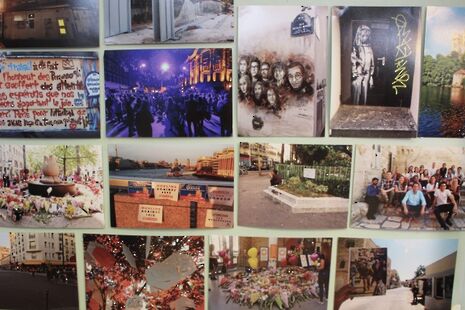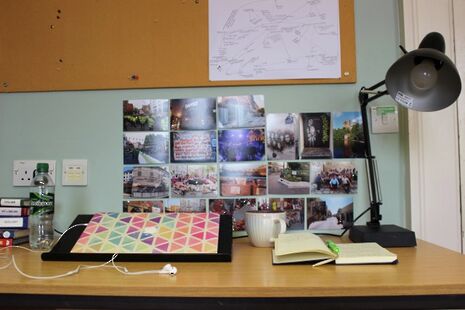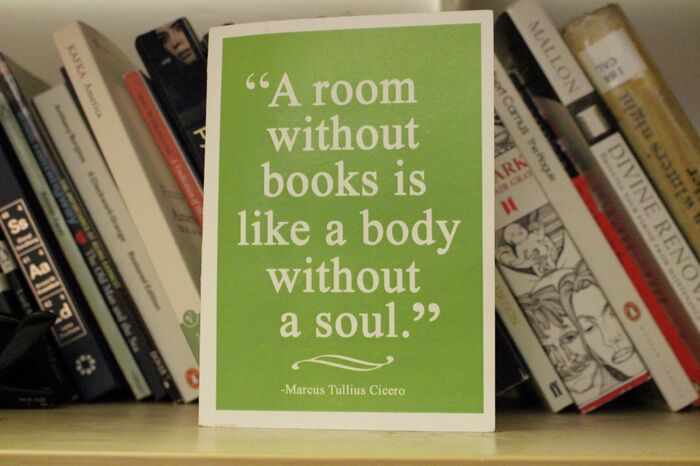DeskSpace: Personal Space
This week, Amy Batley, a PhD candidate with the Centre for Urban Conflicts Research, takes time to talk about creating personal space in a world of conflict

“You’re right on time!” Amy says as she welcomes me into the Centre for Urban Conflicts Research at the Department of Architecture. As she bounds up the winding staircase in front of us, taking two steps at a time, Amy laughingly tells me about her usual “less-than-impeccable” timekeeping. Hurrying behind her, I wonder if that’s why we’re taking the stairs at record speed. As we approach her shared office down a long, high-ceilinged corridor, the PhD candidate tells me about her research with a rapidity evidently engendered by enthusiasm:
“The project is: how does conflict manifest itself in the built environment? My research specifically is: what is the role of terrorism and what happens to cities after a terror attack…. When I tell people about my research they assume that I’m building bollards or designing anti-terrorism infrastructure, but that’s not what I’m working on. I'm looking at the relationship between urban identity, urban citizenship, community and community relations in urban space before or after a terror attack.”
“I would go there if I needed to be peaceful or I'd go for a run and stop and have a rest there”
Amy pushes open the office door. I’m curious to see how someone so interested in the concept of space as both a material and non-material environment, manages their own personal space. “It’s more-than-impeccable” I say as I take in my surroundings. Amy laughs and we sit down in front of a remarkably neat desk to discuss urban conflict, identity and personal space.
Rachel Loughran: Do you think very consciously about how you organise your personal space?
Amy Batley: Yes. I rearranged the desk from last term. It was facing the door but I couldn’t concentrate because I could see everybody come in and out, and it's a really busy office… The photographs are also really important. Most of them are related to my research… that one is personal though [pointing to a picture of Durham Cathedral] It's a view from a bench facing the Cathedral from the river bank. I would go there if I needed to be peaceful or I'd go for a run and stop and have a rest there… Because my work is based on quite transient events, the other photographs help me map out the specific days I’m researching and think about how they are linked.
RL: Speaking of mapping, do you think it’s possible to create an accurate map of something as complex as a city?
AB: You can never really represent the daily challenges of people in a city… A city is not just a space, it’s the experience of that space and the tensions and the conflicts in people’s everyday movement around it.
“I don't feel the need to identify collectively, which is a luxury of being a white British, reasonably well educated person in England, which I recognize.”
RL: So, if you were to guide me around your desk like a map, what am I going to find here? What are its most important landmarks?
AB: The tea mug is absolutely essential!
RL: Biscuits, dunking or not?
AB: I try not to have biscuits in the office or I’ll eat half the packet before I’ve realised.
RL: I suppose it’s nice to keep a little bit of space in our jeans…
AB: [laughs] Absolutely!... Aside from the tea, my laptop is probably the most important thing.
RL: I have to say, your laptop cover is pretty snazzy.
AB: I went on a trip to Jerusalem and everybody had a Mac... I didn’t want mine getting mixed up with someone else’s!
RL: Is this an attempt for identity?!
AB: [Amy laughs] Maybe! Maybe that's what all of this is, I'm trying to claim a space!
“Yes. When you’re doing a PhD you sometimes feel like you are wandering through a forest, and you can get lost so easily. At that point I usually take the time to go for a run.”
RL: On that topic but with a slightly more serious angle, how much do you think the need to have a group identity affects how we relate to a space or to a city?
AB: It’s very important in terms of where you go, where you feel safe, how you express yourself in that space, what you do that space. Personally, I don't feel the need to claim a space in Cambridge, but if you are someone from the Muslim community where the EDL are saying your community is the cause of the Manchester arena attack, of course you're going to put a poster on the side of your mosque saying, “We Love Manchester” to declare an association with the city and to differentiate yourself from the perpetrator.
RL: If you had to put a sign on this desk to represent yourself, what would you put?
AB: I have too many identities! I'd find it really hard! What is my identity?! I think I’m still working that out.
RL: Do you think the ability to have multiple identities is a luxury of having a certain position in society?
AB: Yes. If you look at the ideas of collective identity often it's defensive… if I’m from a community that has been particularly targeted, I'm going to defend that by emphasizing it. I don't feel the need to identify collectively, which is a luxury of being a white British, reasonably well educated person in England, which I recognize.
RL: Have you experienced a major transition from your masters at Clare Hall to your current research position?
AB: Yes. When you’re doing a PhD you sometimes feel like you are wandering through a forest, and you can get lost so easily. At that point I usually take the time to go for a run. But sometimes I’m just so disheartened because I feel like I lack structure. But it's ok. I'm learning that's ok.
RL: Do you think that's why you’re so neat and tidy?
AB: Yes. I think so. I'm projecting into the neatness of my personal space what's not clear in my head! And I think I’m influenced by the people around me. There’s trained architects in here. [Amy laughs] Maybe I’m self-conscious in that sense.
RL: Keeping up appearances. Very nice appearances all the same.

 News / Eight Cambridge researchers awarded €17m in ERC research grants27 December 2025
News / Eight Cambridge researchers awarded €17m in ERC research grants27 December 2025 News / Downing investigates ‘mysterious’ underground burial vault 29 December 2025
News / Downing investigates ‘mysterious’ underground burial vault 29 December 2025 Lifestyle / Ask Auntie Alice29 December 2025
Lifestyle / Ask Auntie Alice29 December 2025 Sport / Hard work, heartbreak and hope: international gymnast Maddie Marshall’s journey 29 December 2025
Sport / Hard work, heartbreak and hope: international gymnast Maddie Marshall’s journey 29 December 2025 News / News in Brief: carols, card games, and canine calamities28 December 2025
News / News in Brief: carols, card games, and canine calamities28 December 2025







